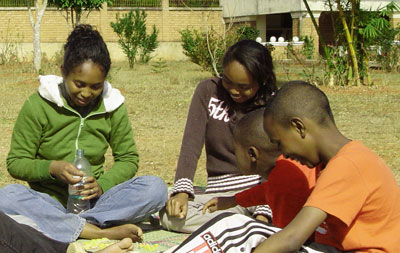Johanesa NIANDONIRINA
Interdisciplinary and Vocational Training Department
Faculty of Arts and Human Sciences
University of Antananarivo
E-mail: fikarohako@gmail.com
Phone number: 26 13 31 11 96 92
MULTIMEDIA AND MULTILINGUALISM
DESCRIPTION
By this course, students will learn how to deal with online journalism, multimedia and translation. The focus will be on blog creation, data and information gathering and multilingual blog making. All along the lecture, theories and practices will be combined. Sometimes, students will have sharing sessions.
LEARNING OBJECTIVES
At the end of this course, students are expected to be able to:
-Distinguish online journalism from classical journalism
-Create a new blog and master WordPress functioning
-Write good articles and post them to their blog
-Produce an objective interview and convert it into MP3 file before exporting it on their blog
-Shoot good photos and videos which are suitable for online broadcasting
-Localize and internationalize a blog
COURSE ATTENDANCY
The department regulations must be respected by all students. If a student misses classes three times without good excuse, the disciplinary committee will have a meeting to decide this student’s fate. Everybody have to respect the “academic fifteen minutes.”
COURSE DEADLINES
Students must respect the deadlines; otherwise, they will be penalized.
VERY IMPORTANT
Never give a ring nor send short message to the instructor.
Teaching will be in French
GRADING INFORMATION
Blog creation and personalization, including the article in French<10
Audio<15
Photos and soundslides <20
Video<25
Localization and translation<25
Intervention and level of participation<05
TOTAL<100
COURSE SCHEDULE
I- INTRODUCTION TO THE ONLINE JOURNALISM
Week 1
Introduction to the course and the schedule
Week 2
The difference between the online journalism and the online press
Week 3
The online journalism and multimedia mastering
Week 4
Sharing and discussion on online journalism in Madagascar
II- CREATION OF A NEW BLOG
Week 5
Ethics and online journalism
Week 6
Introduction to blog creation
-Exercise <create your new blog and write an article according and pay attention to lessons in chapter I
Week 7
Discussions and sharing on journalism participatory (student will conduct a survey before that)
Week 8
Introduction to audio interview
Exercise <make an interview related to the topic of your article
(Instruction: do not mention to the interviewee that it is an exercise)
Week 9
Introduction to photojournalism
-shooting and editing in photoshop
Exercise < shoot some photos and edit them
Week 10
Introduction to soundslides
Exercise< with the photos shot for the last exercise, make a sounslides and post it to your blog
Week 11
Introduction to video shooting
Exercise <make a video shooting
III- AUDIOVISUAL TRANSLATION (TVA) AND LOCALIZATION APPLIED TO ONLINE JOURNALISM
Week 12
Video editing
Exercise <edit your video
Week 13
Introduction to B-roll and video interview
Exercise < combine the interview and B-roll then upload them to Youtube)
Week 14
Sharing and discussion about localization applied to online journalism (the student are supposed to know what is localization and audiovisual translation and how to deal with it)
Week 15
Translation and localization of the blog (part I)
Target languages: Malagasy and French
Week 16
Translation and localization of the blog (part II)
Note: Each course lasts three hours. Each exercise is to do at home. Before starting a new lesson, those who have problems and difficulties can ask questions.





